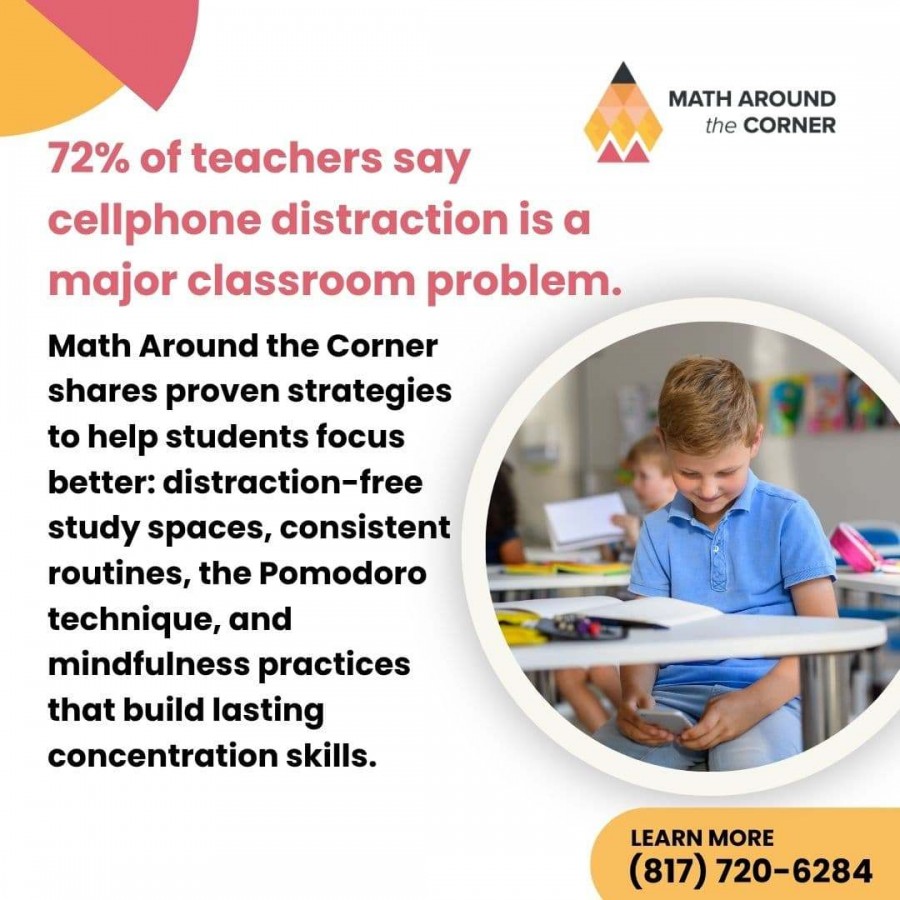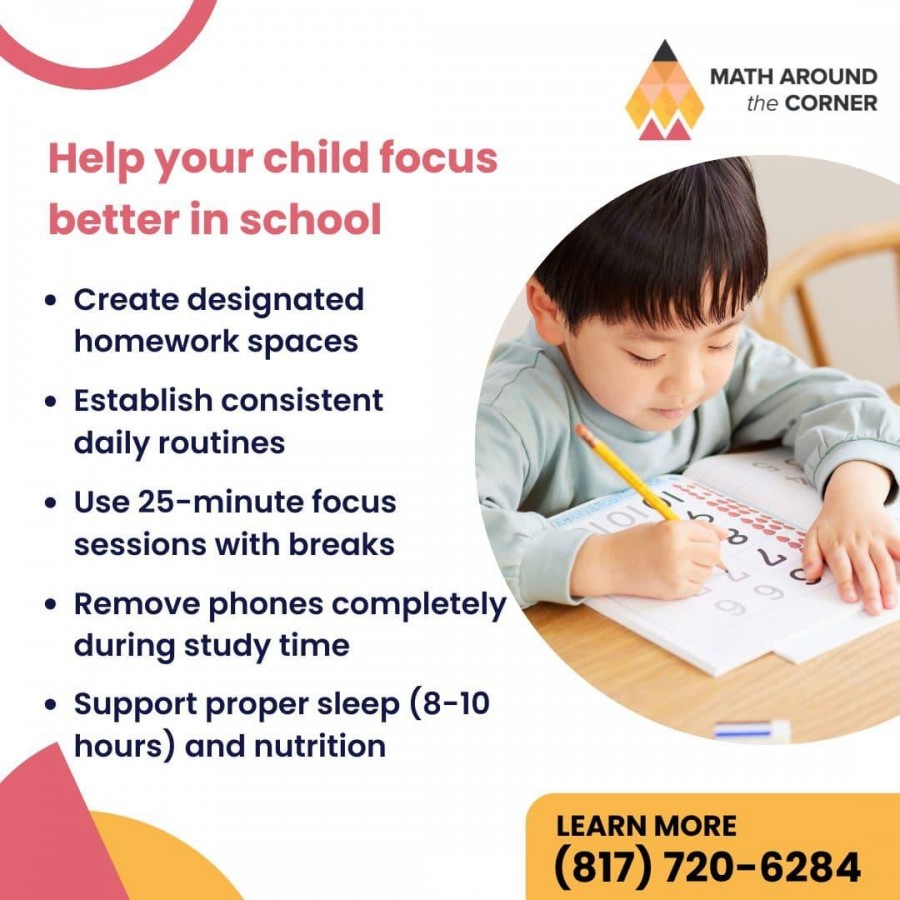The Distraction Epidemic: How to Help Kids Focus Better in School and at Home

Students today face more distractions than any generation before. Between smartphones, social media, noisy classrooms, and demanding schedules, maintaining focus has become one of the biggest challenges for academic success. Many parents are now searching for effective strategies on how to focus better in school. According to the Pew Research Center, 72% of high school teachers report that students being distracted by cellphones is a major problem in their classrooms. The good news? Parents and teachers can implement proven academic success strategies that help students improve focus in school and build lasting concentration skills.
At Math Around the Corner, we help students strengthen focus and concentration through personalized, one-on-one tutoring that targets learning habits, study routines, and problem-solving skills.
Key Takeaways
- Digital devices are the leading distraction, causing students to miss up to 25% of class instruction time.
- Consistent routines and organized study spaces dramatically improve students' ability to concentrate.
- Short, focused work periods with regular breaks maintain attention better than long study sessions.
- Executive functioning and student organization skills are foundational for academic success and can be developed through practice.
Physical activity, proper sleep, and good nutrition directly impact brain function and concentration abilities - and improve focus in school.

Understanding the Distraction Crisis
The numbers tell a concerning story. According to a survey by the EdWeek Research Center, about one-third of educators report that students using devices for learning spend over a quarter of their class time off-task. That translates to about 90 minutes lost every single school day. For high school students, the problem intensifies with digital devices consuming attention every few minutes.
Distraction isn't just about phones. Students face attention breaks from multiple sources: peers talking, environmental noise, hunger, fatigue, anxiety, and their own wandering thoughts. Each distraction pulls focus away from learning, and getting back on track takes time. Students may need up to 20 minutes to fully refocus after being interrupted.
The impact goes beyond lost time. When students cannot concentrate, they miss information, fall behind in class, and develop gaps in understanding. These gaps compound over time, making future lessons harder to grasp. Students then struggle with homework, score lower on tests, and feel increasingly frustrated with school.
Parents often notice the signs at home. Kids take hours to complete 30 minutes of homework. They stare at pages without reading. They ask what comes next, even though you just explained it. These behaviors signal concentration problems that need attention.
What Causes Students to Lose Focus in School?
Understanding why kids struggle to concentrate helps identify the right solutions and improve focus in schools. Multiple factors contribute to attention problems:
Digital Overload: Smartphones and tablets have trained brains to expect constant stimulation. Apps are designed to grab attention with notifications, bright colors, and endless scrolling. This conditioning makes sitting through a 45-minute lesson feel impossibly boring. Students check their phones during class, losing the thread of instruction with each glance.
Sleep Deprivation: Many students don't get enough quality sleep. Between homework, activities, screen time, and early school start times, adequate rest gets squeezed out. Tired brains cannot focus effectively. Memory formation suffers. Processing new information becomes difficult.
Poor Nutrition: Skipping breakfast, eating high-sugar snacks, and drinking excessive caffeine create energy crashes that tank concentration. When blood sugar drops, focus drops with it. Students feel foggy, irritable, and unable to think clearly.
Anxiety and Stress: Worried minds wander constantly. Students stressed about grades, social situations, family problems, or future concerns find it nearly impossible to stay present during lessons. Their mental energy goes toward managing anxiety rather than learning.
Lack of Structure: Students without consistent routines struggle more with attention. When expectations change daily, when materials aren't organized, when time isn't managed well, the brain expends energy figuring out logistics instead of learning content.
Overstimulating Environments: Classrooms packed with decorations, posters, and visual clutter can actually harm concentration. Research shows students in highly decorated classrooms demonstrate smaller learning gains than those in simpler spaces.
Types of Distractions and Their Impact

How to Help Kids Focus Better at Home
Create a Distraction-Free Study Environment
Designate a specific spot for homework that stays the same each day. This space should have good lighting, comfortable seating, and all necessary supplies within reach. Remove TVs, gaming systems, and other temptations from the area. Keep phones in another room during study time.
The brain learns to associate locations with activities. When students study in the same spot consistently, their minds shift into focus mode more easily upon sitting down. This environmental cueing makes concentration feel more automatic over time.
Establish Consistent Routines
Set specific times for homework, meals, activities, and sleep. Routines reduce the mental energy needed to make decisions about what comes next. Students know to expect homework at 4:00 PM, so their brains prepare for focus as that time approaches.
Build in short breaks between subjects or after 25-30 minutes of work. Research shows students retain information better when study sessions are broken into manageable chunks rather than one long block. These breaks let the brain rest and process what it has just learned.
Implement the Pomodoro Technique
This time management method works well for students. Set a timer for 25 minutes of focused work, followed by a 5-minute break. After four cycles, take a longer 15-30 minute break. This structure makes extended focus feel achievable while building concentration stamina gradually.
During work periods, students tackle a single task without switching. During breaks, they move around, stretch, grab water, or do something completely different. The timer creates urgency that helps maintain attention.
Minimize Digital Distractions
Phones are the biggest focus killers. During homework time, phones should be completely out of sight, not face down on the desk, but in another room. Even the presence of a phone reduces cognitive capacity because part of the brain stays alert to it.
Use apps or browser extensions that block distracting websites during study periods. Turn off all notifications. If students need computers for work, close unnecessary tabs and applications. The goal is single-tasking rather than multitasking.
Support Proper Sleep and Nutrition
Students need 8-10 hours of sleep for optimal brain function. Establish consistent bedtimes and wake times, even on weekends. Avoid screens for at least an hour before bed, as blue light interferes with sleep quality.
Provide protein-rich breakfasts and healthy snacks. Foods with sustained energy, like nuts, fruits, whole grains, and yogurt, help maintain stable blood sugar and steady concentration. Avoid sugary snacks that cause energy spikes and crashes.
Academic Success Strategies for Better Focus in School
Teach Student Organization Skills
Organization dramatically affects concentration. When students spend energy searching for materials or remembering what's due when, they have less mental capacity for actual learning. Implementing solid student organization skills frees up cognitive resources for academics.
Start with physical organization. Students need designated spots for everything: a folder for each class, a planner for assignments, and a homework station at home. Color-coding helps younger students remember which materials go with which subjects.
Time management falls under organization too. Students benefit from learning to estimate how long tasks take, break large projects into smaller steps, and prioritize based on deadlines and difficulty. These skills develop gradually through practice and guidance.
Build Executive Functioning Skills
Executive functioning encompasses the mental skills needed for planning, organizing, starting tasks, staying focused, and managing time. Strong executive functioning directly predicts academic performance and real-world success.
Parents can help develop these skills through daily practice. Have students plan their after-school schedule, explaining their reasoning. Ask them to estimate how long homework will take, then reflect on whether their estimate was accurate. Help them break down complex assignments into actionable steps.
At Math Around the Corner, we offer specialized executive functioning coaching that targets these underlying cognitive skills. Our program helps students develop stronger attention regulation, working memory, cognitive flexibility, and self-monitoring abilities through personalized strategies and consistent practice.
Encourage Physical Activity
Exercise powerfully boosts concentration. Even moderate physical activity increases blood flow to the brain, improving focus and information processing. Students who exercise regularly demonstrate better attention spans and academic performance than sedentary peers.
Short movement breaks during homework help reset attention. Students can do jumping jacks, run up and down stairs, or dance to one song. This physical activity gives the brain a break while energizing the body for the next study segment.
Practice Mindfulness Techniques
Mindfulness training helps students notice when their minds wander and gently redirect attention back to the task. Simple breathing exercises, even just 5 minutes daily, strengthen the brain's attention networks.
Teach students to take three deep breaths before starting work. When they notice their thoughts drifting, they pause, breathe, and refocus without judgment. This practice builds the mental muscle of sustained attention over time.
Implement Active Learning Strategies
Passive learning, just reading or listening, makes focus harder. Active engagement keeps attention sharp. Students should take notes by hand, ask questions, explain concepts aloud, and teach material to someone else.
When reading, students can use highlighters, write margin notes, and pause to summarize sections in their own words. For math and science, working on practice problems actively engages the brain far more than reviewing examples.
How Parents and Teachers Can Support Student Focus
Communicate and Collaborate
Parents and teachers working together create consistency across environments. Share observations about attention difficulties. Discuss which strategies work at home versus school. This partnership helps students develop focus skills that transfer between settings.
Regular check-ins help identify problems early. If a student suddenly struggles with concentration, there may be an underlying cause - stress, bullying, learning difficulties, or health issues. Early intervention prevents small problems from becoming major obstacles.
Set Realistic Expectations
Not all students can focus for the same length of time. Younger children and those with attention difficulties need shorter work periods and more frequent breaks. Expecting a 7-year-old to sit still for an hour sets everyone up for frustration.
Gradually increase focus time as skills develop. Start where the student is successful, maybe 10 minutes, and slowly extend the duration. Celebrate progress rather than comparing to peers.
Model Good Focus Habits
Children learn by watching adults. When parents constantly check phones, interrupt their own tasks, and demonstrate poor time management, kids absorb these habits. Model the behavior you want to see.
Show your child how you manage your own attention. Talk through your process: "I need to focus on this report, so I'm turning off my phone notifications and setting a timer for 30 minutes." Visible examples teach more than lectures.
Address Underlying Issues
Sometimes focus problems signal deeper concerns. Learning disabilities, ADHD, anxiety disorders, vision problems, and hearing difficulties all affect concentration. If basic strategies don't help, consider a professional evaluation.
Academic struggles often aren't about effort or intelligence. They reflect skills that need development or conditions that need support. Getting appropriate help transforms student success and self-esteem.

Building Better Focus: Math Around the Corner
Helping students develop stronger concentration takes time, patience, and the right support. At Math Around the Corner, we understand that focus difficulties affect every subject and every aspect of learning. That's why our approach goes beyond traditional tutoring to address the underlying skills students need for academic success.
Our executive functioning program specifically targets the cognitive skills that support sustained attention, planning, organization, and self-regulation. Through personalized coaching, students learn practical strategies they can apply across all their classes and at home.
Founded in 2006 by Carol Bearden, Math Around the Corner has helped Fort Worth students develop the skills they need to succeed in school and beyond. Our tutors, many from Texas Christian University and other area colleges, work one-on-one with students to build both subject knowledge and the learning skills that make academic success possible.
We serve families throughout Fort Worth, Benbrook, Aledo, and the entire DFW metroplex with both in-person and virtual tutoring options. Whether your child struggles with focus during homework, has trouble staying organized, or needs strategies to manage classroom distractions, we provide the support that creates lasting change.
Call (817) 720-6284 or email hello@matharoundthecorner.com to learn how our personalized approach can help your student build stronger focus and achieve academic success.
Unlike large tutoring chains, we're locally owned and operated with deep connections to Fort Worth schools and families. We know the challenges students face, and we have nearly 20 years of experience helping them overcome those obstacles.
Don't let distraction hold your child back. The academic success strategies and student organization skills we teach create benefits that extend far beyond better grades. Students gain confidence, independence, and the ability to manage their own learning. These are skills that serve them throughout life.
Students who learn how to focus better in school don't just perform better academically. They feel more confident, less stressed, and more in control of their education. They develop habits that support success in college, careers, and personal goals. The investment in building these skills now pays returns for decades to come.
Contact Math Around the Corner today to discover how personalized tutoring and executive functioning support can transform your child's ability to focus, learn, and succeed.
